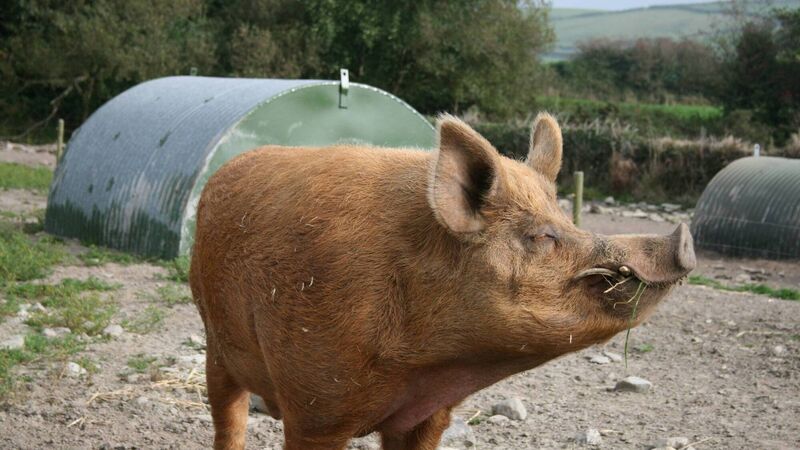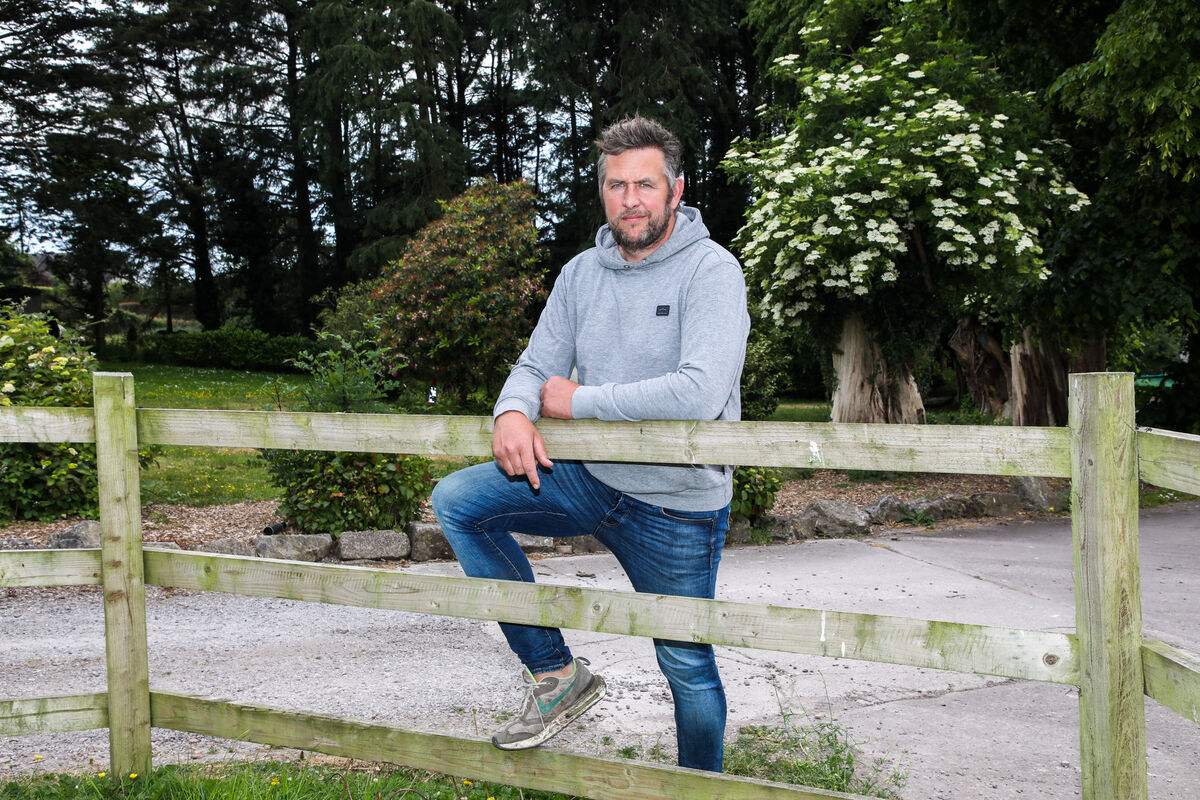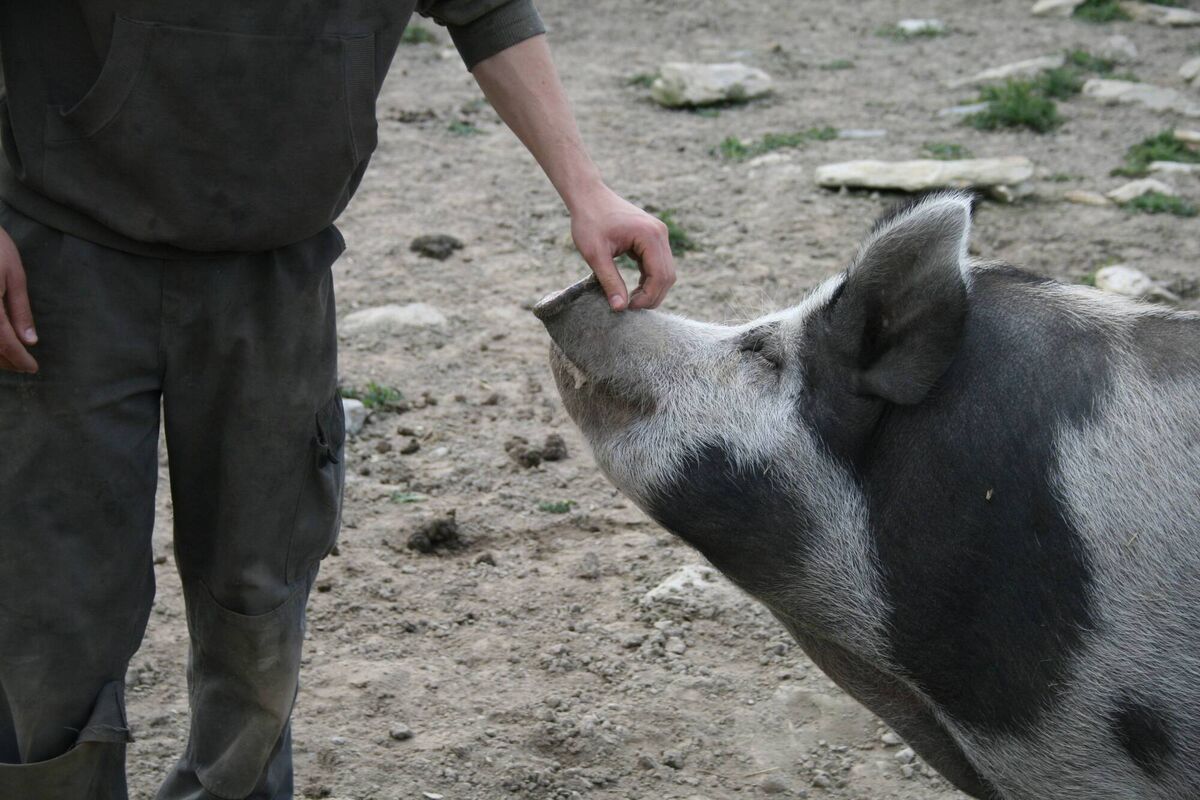‘The situation is volatile, but we’ve not given up’: Cork pig farmers facing challenges

One of the pigs at Caherbeg Farm, which was established in 1997 by the Allshire family. Picture: Kate Ryan
Small-scale free-range pig farmers in Cork are increasingly forced to travel further away from their farms to access an abattoir that can process their animals.
This lack of access has become a full-scale crisis, with some declaring for the first time in decades that there will be no Christmas hams for sale from them this year.
In The Pig In Irish Cuisine Past And Present, food historian Dr Máirtín Mac Con Iomaire said: “In Ireland today, we eat more pork per capita than any other meat, yet you would very seldom if ever see a pig.”
It wasn’t so long ago pigs were in plain sight, kept in gardens and yards and once referred to as “the gentleman who pays the rent” such was their importance to the household coffers.
But since the 1960s, the domestic practice of keeping a pig has declined, continued only by a few determined smallholders today.
Of commercial pig herds, most are raised intensively indoors in so-called integrated units.
However, a small number of farmers still rear their pigs outdoors, and in Cork, a handful are continuing that tradition.
Pigs are the third most valuable livestock commodity in Ireland after beef and lamb, and the export potential of Irish pork is growing steadily by value and volume, 3% year on year in 2025.
This should read like a success story for Ireland’s pig industry, but for farmers of free-range pigs, the declining access to suitable abattoirs is impacting the viability of their farms. For some, this means ham will be off the menu not just for Christmas, but year-round.
How did it get to this?
To understand why, we must step back in time.
In 1973, Ireland joined the EU, and in 1988 passed The Abattoirs Act in response to new Regulations that intended to improve standards Europe-wide. At the time, Ireland still had a robust network of local abattoirs often connected to a high street butcher. Of those that fell short of the incoming EU standards, some decided the investment needed wasn’t worth it and shuttered for good.
The snowball effect of local abattoirs closing began to fundamentally change the way meat was sourced and produced here.
In place of local abattoirs came large-scale meat processing plants built around maximising efficiencies to increase throughput, including the type of pig: a Large White, around 119kg and 5-6 months old.
To give a sense of scale, in the first six months of this year, 1.5 million pigs were slaughtered in Ireland, most through plants like these.
But what has this all got to do with whether you’ll have a Christmas ham this year?
In May, pig farmer Peter Twomey, of Glenbrook Farm in White’s Cross, was told his abattoir, Finns of Mitchelstown, was closing, forcing him to transport his outdoor-reared pigs to a facility in Portlaoise, a round trip taking nearly five hours.
“It makes no sense,” he says. “The pigs travel a few metres from the field to the truck, but then travel so far for processing. It’s crazy.”
One reason, Peter explains, is because many abattoirs don’t have an essential piece of equipment called a dehairer.

“Pigs that are reared outdoors are very hairy compared to pigs reared indoors that have no hair,” he says. “Customers don’t want to buy hairy bacon, so we can only go to an abattoir that can remove the hair, and they are few and far between.
“Some counties have no access at all, but no-one should have to leave their county to have their animals processed,” says Peter. “It wasn’t so long ago every butcher had its own abattoir. Lots of people want to run their own, but they aren’t being supported; there’s no grant aid available for the likes of them.”
As well as the inconvenience of travelling further and less regularly, Peter must plan much further ahead to ensure there is enough stock to service the on-site farm shop.
“For our cured meats like bacon, I have to plan at least two weeks out for stock: a week to get the pigs to the abattoir and for them to come back to me, and then another week for curing into bacon and ham. The reality is that the logistics have become very hard to manage.”
The loss of Finns in Mitchelstown came just as Glenbrook Farm was gaining new customers in restaurants. For now, that growth is stalled as Peter’s priority is to stock the farm shop.
“A load of houses have sprung up all around the farm; that’s potentially 3,000 people who could walk here from their home and buy their meat from us if they want to be a part of what we’re doing here. That’s what we want to grow, a community around the farm.”
In addition, many larger abattoirs will only take in pigs from Bord Bia-approved farms. Glenbrook Farm doesn’t have that approval, although, Peter says, he would happily stand over his opinion that his pigs have a better quality of life at his farm than those raised indoors at farms that do have the approval.
“We simply don’t need it,” he says.
Regulation is a one size fits all approach that can tend to benefit large abattoir operators over smaller ones. While everyone agrees that no-one should be exempt, if we lose the smaller operators, all routes to market for small-scale food producers like Peter are also lost.
If that happens, all that is left is food produced by farms and abattoirs geared for more intensive food production.
“The model for large scale abattoirs is being copy-and-pasted onto smaller abattoirs and it just doesn’t work – it’s not a fair system,” says Peter. “The priorities are all wrong. Why can’t Ireland feed Ireland first, and then export the excess? This isn’t just a local problem; it’s a nationwide one.”
Will Allshire is a second-generation pig farmer and butcher with his brother, Maurice, in Rosscarbery. The business has two sides: Rosscarbery Recipes which produces sausages and rashers from bought-in pork, and Caherbeg, which produces pork products from their own free-range pigs on the farm.
The farm was established by Will’s parents, Avril and Willie Allshire, in 1997 and is well-regarded for its free-range home-cured hams at Christmas. But for the first time in 25 years, the family have taken the difficult decision to not offer hams for Christmas this year.
The Allshires also used Finns of Mitchelstown as their abattoir, but Will was able to secure space at two abattoirs in West Cork, one in Bantry and one in Kealkil. Both have less capacity, which means there is less meat available.
“We had four months’ notice of Finns closing, and because of the uncertainty, we decided to scale back on the farm and stopped breeding pigs five months ago. The Caherbeg business is still viable but it’s borderline. We’re busy with Rosscarbery Recipes and that’s keeping us going,” says Will.
“People don’t understand what’s going on. They are disconnected from how much work goes into getting food on the table, the facilities and infrastructure needed to make that happen.”
There is a twist in this tale, however, as Will says that, on paper at least, Ireland has more abattoir capacity than it needs.

“We have too many big operators not running at full capacity, but not enough smaller operators to mind the people that want to kill just one or two pigs a week. But I actually think the biggest issue with small abattoirs is that there isn’t anyone coming through to take them over. A lot of abattoirs closed because the owner retired. That’s the reality of it.
“Our free range pork business is day to day at the moment,” says Will. “I couldn’t tell you what it’s going to look like in a year or two because the situation is too volatile. If you’d asked me last year, I would have said we’re growing our numbers because the system was working and everything was fine. It just goes to show that we’re only one block away from having the whole house brought down around us. But we’ve not given up hope yet.”
While both farmers face significant challenges, they are speaking up to highlight the issues and not to complain.
What they want is real change that supports a vibrant and important food sector that delivers local food for local people. I asked Peter and Will if they could get in front of someone who could change the direction of food policy in Ireland to one that supports food producers like them, what would they say.
“It would make a massive difference if the government could release funding for training of abattoir staff and review this policy of one size fits all when it comes to regulation because that’s a disaster,” says Will.
“If it was a policy that a percentage of meat raised had to be sold locally into an abattoir and butcher, or a section in the supermarket that championed locally reared and produced meat, that might be enough to regrow the sector,” says Peter.
Consumers have power in this too by choosing to spend a little more on meat from free-range animals. It’s no small ask with rising food inflation and a cost of living crisis a daily reality, but if we don’t support local food, then, as Will says, when it’s gone, it’s gone forever.
- Instagram: @glenbrookfarm & @rosscarbery_recipes







 App?
App?


